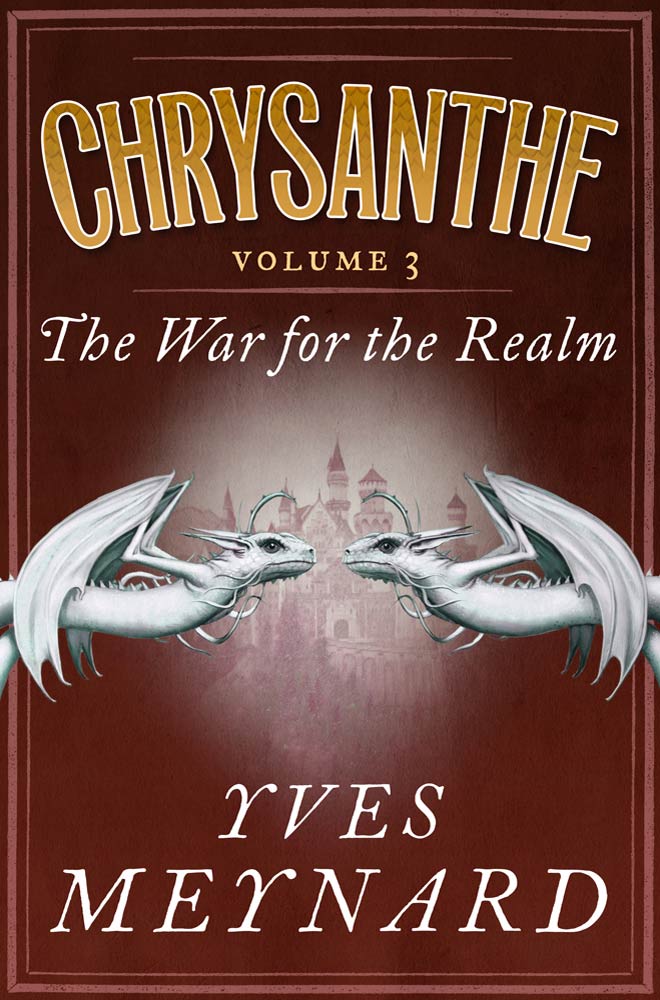Yves Meynard, Chrysanthe
reviewed by Danielle L. Parker

Chrysanthe Publisher: Tor, 2012 Length: 496 pages ISBN: 978-0-7653-3026-0 |
When I read Meynard’s wonderful earlier work The Book of Knights, I marked Meynard down as one of the best writers in the fantasy genre and someone to watch. I waited eagerly for another book. I have it in my hands now: a thick tome published, unfortunately, in a small, non-geezer-friendly font size. Eleven p.m. at night, with an eye-strain headache and nearly 500 pages behind me, I sit and reflect on the story.
And in fact, right now, I’m a bit afraid to go to bed. The scenes of graphic violence (rape, gruesome killings, cannibalism, even) in this story are conveyed with a clinical detachment (and detail) worthy of Grimm’s stepmother dancing in her fiery shoes. I need a friendly cat to purr on my lap, bright lights, and a cozy cup of something hot. Not to mention locked doors and something stupid and cheerful to ease my bruised sensibilities.
And yes, I’m disappointed. I bought the amazing Book of Knights for my permanent collection, and treasure it. Sadly, the author had obvious greater ambitions with Chrysanthe. Sometimes, with eyes fixed on the higher prize, authors stumble. They forget it’s not the grand and ambitious that touches our hearts. It’s the small-scale and personal. People, in other words, and how we feel about them, and not the rise and fall of kingdoms, or the philosophies of God.
Chrysanthe begins with suspicious commonalities with The Book of Knights. The young orphan of the first story was warped by the chilly religious dogmatism of his guardians. The young orphan of Chrysanthe is warped by an incompetent psychiatrist. The creepy doctor convinces young Christine she has been raped multiple times as a child, including by her own father. Christine’s memories, which she tries to cling to, contradict that view, but the doctor, aided by drugs and hypnotism, is having none of her “denial.” Years pass, and Christine herself eventually believes she’s been the victim of horrific abuse. She’s a frigid ruin.
Still, doubts remain. One day she sees a young man who seems to know her. Christine, who is now terrified of males in any form, reacts with hysteria. But something still draws her to the young man. His voice reminds her of a childhood magic rabbit she imagined. The young man tells her she is a princess spirited from her magic kingdom by evil magicians. Christine, whose self-hate and terror are beyond reason, doesn’t believe him.
Yet the young man Quentin, who calls himself a knight, has that familiar voice of her childhood rabbit friend. Christine, trapped in her loveless life with her distant Uncle as guardian, decides if she’s crazy, Quentin’s craziness is better than what she has now. With an instinctive magic ritual, she calls the knight to her. Christine and Quentin, pursued by the uncle who sheds his disguise to reveal the evil magician he really is, escape and head for the kingdom of Chrysanthe.
The best part of the book is the first third describing our pair’s journey across myriad ever-changing worlds, pursued by the truly terrifying shape-shifting magician Mathelian. Here Meynard’s gift for vivid fairy-tale imagery shines.
It’s when we reach the kingdom of Chrysanthe that the story stops working. Quentin and Christine become secondary characters, and the story spreads out too wide and too thin for us to connect long to any particular character. Christine, whose early struggles we respected, manages only weak efforts once she reaches Chrysanthe. She hides in her room and fails to connect with her gentle and lonely father, the king. Yes, she’s been through a lot, but it’s hard to respect someone as utterly paralyzed and consumed by neuroses as she is. Her father disappears, the kingdom’s going to heck in a hand-basket, and Christine can’t manage to get out of her room.
Quentin, for his part, has an affair with the new central character, the king’s court enchantress, Melogian. Quentin himself, when he appears at all (he vanishes on a lengthy visit to his parents during the crucial part of the story), is too sanctimonious and chivalric to woo his true love Christine (he somehow maintains a noble mien even when he’s in the enchantress’ bed). In turn, Melogian, the enchantress and main focus of the last two-thirds of the story, is too full of wallowing self-pity, excuses and self-doubts to connect with this reader. And the deus ex machina, with the magical appearances of some long-lost heroes and magicians to destroy the formerly superhuman demons of the evil magician Casimir, feels none too cathartic.
What (or who) really stands out in the last two-thirds of the book? The two evil magicians: the ferociously dogged, conflicted Mathellin, and the creepy, it’s-all-a-game robber-of-the-dead, Casimir. And when the bad guys and their graphically evil deeds (which include rape and disemboweling) are the most vivid characters in the story, we have serious problems.
If you’ve never read Meynard, buy The Book of Knights. It remains one of the best, and most unique, fantasy novels I own. As for Chrysanthe, I hope Meynard scales back his ambitions in future stories. The gift’s still there, as his detailed villains prove, but we never connect to Quentin, Christine, and Melogian as we did to the brave young knight of his earlier and better work. It’s not the epic that touches our hearts. As always, it’s the characters. Readers are simple creatures. We just need someone to root for.
Copyright © 2012 by Danielle L. Parker

